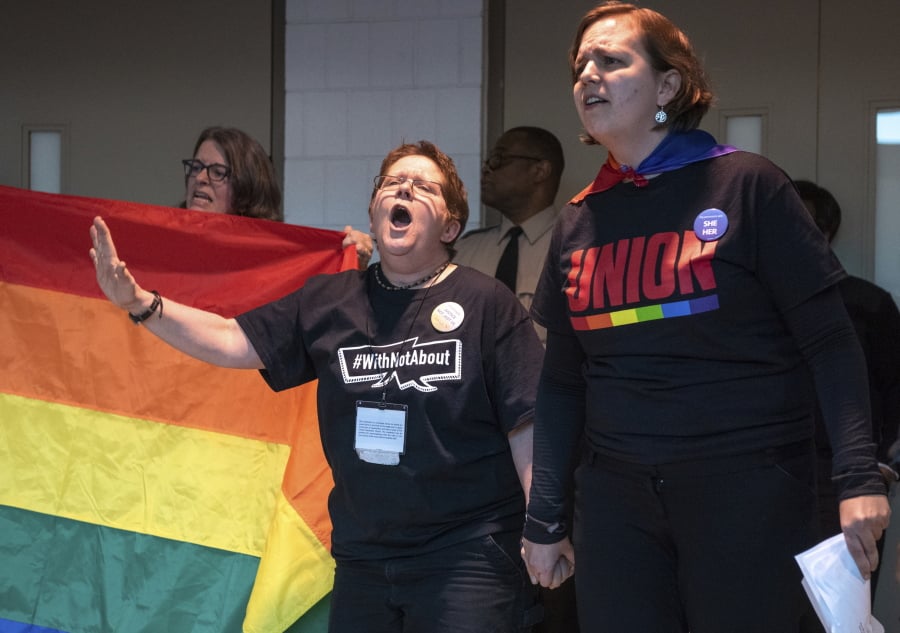“Stop the harm!” was shouted from the stands after the United Methodist Church voted Tuesday to maintain bans against LGBTQ clergy and same-gender marriages. The refrain pointed to the ethos of John Wesley, the Methodist movement’s founder: Do no harm, do good and stay in love with God.
“It was devastating to watch the church protest each other,” said the Rev. Meredith Gudger-Raines, pastor at Ridgefield United Methodist Church. At last week’s general conference in St. Louis, she observed the ruling and protests that left the church divided.
“Today, Methodists are reeling. We’re in grief and we want to be better than we are. The clergy I know are working furiously to remind LGBTQ folks that they’re beloved children of God,” she said. “We are working furiously against our own church.”
The United Methodist Church is one of the largest Protestant denominations in the world. There are about a dozen churches in Clark County; they are part of the Western Jurisdiction that took a stand against Tuesday’s ruling, saying the jurisdiction remains committed to fully including everyone regardless of sexual orientation. The jurisdiction has defied the denomination’s rules for years.
“The clergy in the Western Jurisdiction don’t stop at just ‘you can come in our doors.’ We affirm people in that we recognize that you are created perfectly, and we love you and God loves you exactly as you are,” said the Rev. Susan Boegli of Battle Ground United Methodist Church.
Clark County clergy took out an ad in The Columbian on Saturday, affirming as much. The ad says: “We have been, and will be, honored to officiate LGBTQIA weddings and funerals, and provide pastoral care. We are committed to working toward an inclusive church that reflects the full diversity of God’s creation, and we invite you to join us.”
“We don’t want the people who were in St. Louis speaking for us. There were some hateful things that were said on the floor of general conference, and we don’t want that to be the word of the church,” the Rev. Jo Ann Schaadt Shipley of Vancouver Heights United Methodist Church said. The church’s signboard was changed to read ‘for harm done by the church we are sorry.’ There was also a time of prayer Tuesday and Wednesday.
“We were really hoping that the denomination would be moving forward to where we are in the West, that there would be full inclusion,” Schaadt Shipley said.
The Rev. Rachel Byers, a local deacon not appointed to any specific church, was among those who were disappointed by the ruling.
“It’s a big thing for me because I’m one of the only out LGBT clergy,” she said. She’s interested to see what the response is like when she goes to church today.
She pointed toward the ruling’s historical context. In 1972, the church voted to explicitly say that homosexuality was incompatible with church teachings. Since then, groups have fought to strengthen or loosen restrictions. The debate came to a head at the last conference in 2016, which lead to this year’s gathering organized specifically to resolve this issue.
Two plans
At the conference, two plans were put forth. The One Church Plan gave individual congregations the authority to decide where they stand and how they operate. The Traditional Plan, the one that prevailed, applies globally; it puts a blanket ban on self-avowed practicing gay clergy and same-gender weddings, as well as adds punitive measures to those who disobey.
“The context in which United Methodists live varies tremendously across the world,” said the Rev. Kathy Neary, transitional ministry developer with the Pacific Northwest Conference covering Washington and Northern Idaho. “In some places where homosexuality is illegal it just would not be practical for the church to stand up and support gays and lesbians.”
She supported the One Church Plan and was visiting a church in Canada when she heard the news that the Traditional Plan was going to win despite two-thirds of U.S. delegates voting against it.
“It was amazing how my heart just dropped,” she said. “We have the shortest memories ever in the church because we have fought these battles of inclusion and exclusion over and over again. The Methodist Church didn’t fully ordain women until 1956. It wasn’t until 1968 when we became the United Methodist Church that we stopped officially segregating our race by church.”
The Rev. Christopher Gudger-Raines is pastor at Orchards United Methodist Church, which he described as a politically diverse congregation.
“We have reached a threshold where this issue is almost settled,” he said. “I was really — I don’t know if I was surprised — but I guess saddened that we could still be kicking people out, that we still think marginalizing people is a Christian thing to do.”
He said there’s a lack of awareness and a dismissal of the harm being done to people in the church. Many could leave because they don’t feel welcome or don’t feel their friends and family are welcome.
Neary and Byers noted that much of the Traditional Plan has previously been deemed unconstitutional by the church’s own standards. So, it’s unclear what policies, if any, will move forward.
Regardless, Neary said, “We have harmed people again in very, very deep ways, and we’ve certainly harmed the reputation of the United Methodist Church.”
It’s also difficult to discern whether the church will split. Some churches, on either side of the issue, could disaffiliate from the United Methodist Church.
“My fear is that a split would divide me from the church that raised me and that my parents are still a part of,” said Christopher Gudger-Raines, who hails from West Virginia. “It would be painful to me if we were to split.”
Retired Methodist pastor David Tinney recalled earlier infighting within the Pacific Northwest Conference over homosexuality.
“We yearned for coming back together, and we did,” he said. He hopes the same for the global United Methodist Church. “I think that can happen slowly. … Our job is to keep opening our doors, walking with people and finding some way to allow them to feel at home.”




